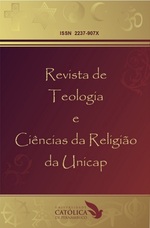O BANIMENTO DE PROFETAS NO PARAÍSO APOCALÍPTICO DO TRITO-ZACARIAS
DOI:
https://doi.org/10.25247/paralellus.2019.v10n25.p449-459Palavras-chave:
Apocalipse, memória cultural, profecia, antigo Israel.Resumo
Este artigo postula o contexto do século II a.C. em que as últimas profecias do livro de Zacarias. Estão inseridas em ambientes de conflitos sociais na Palestina, dimensionando tanto a política central quanto a esperança popular. Nessa política, a profecia israelita não mais repercute por pertencer a uma sociedade estruturalmente estatal. Nossa hipótese é que o enunciado que tomamos por fonte (Zacarias 13.2-6) transmite a mensagem dos novos porta-vozes de Yahweh e marginaliza os profetas. Assim, tem a intenção de inspirar a restauração comunitária sem retroprojetar as tradições reais. Nesse sentido, estamos diante de enunciado singular. Por esta perspectiva historiográfica, a natureza da linguagem apocalíptica é incorporada ao processo de refundação na qual emerge o poder sacerdotal, portanto é escribal e sem profetas – sem visão e transmissão oral de mensagem divina –, ainda que em seu contexto haja reinterpretações proféticas. Em nosso postulado demonstraremos que, na apresentação da nova comunidade de Yahweh – um mundo celestial habitado por anjos –, os sacerdotes tomam para si a tarefa de presidir e naturalizar o genocídio de profetas.
THE BANISHMENT OF PROPHETS IN THE APOCALYPTIC PARADISE OF THE TRITO-ZECHARIAH
Abstract
This article postulates the context of the second century B.C. in which the last prophecies of the book of Zechariah. They are embedded in environments of social conflict in Palestine, scaling both central politics and popular hope. In this policy, Israelite prophecy no longer resonates because it belongs to a structurally state society. Our hypothesis is that the statement we take from the source (Zechariah 13: 2-6) conveys the message of Yahweh’s new spokesmen and marginalizes the prophets. Thus, it intends to inspire community restoration without over-projecting the royal traditions. In this sense, we are facing a singular statement. From this historiographical perspective, the nature of apocalyptic language is incorporated into the process of refounding in which the priestly emerges, so it is scribal and without prophets – without vision and oral transmission of divine message –, even though in its context there are prophetic reinterpretations. In our postulate we will demonstrate that in presenting the new community of Yahweh – a heavenly world inhabited by angels –, priests take it upon themselves to preside over and naturalize the genocide of prophets.
Keywords: Apocalypse; cultural memory; prophecy; ancient Israel.
Downloads
Referências
ALONSO SCHÖKEL, Luis. Dicionário bíblico hebraico-português. Tradução de Ivo Storniolo e José Bortolini. São Paulo: Paulus, 1997.
CARTER, Charles E. (Re)Defining “Israel”: the legacy of the Neo-Babylonian and Persian Periods. In: NIDITCH, Susan (Ed.). The Wiley Blackwell companion to ancient Israel. Malden, MA: Wiley Blackwell, 2016, p. 215-240.
COLLINS, John J. Apocalypticism. In: NIDITCH, Susan (Ed.). The Wiley Blackwell companion to ancient Israel. Malden, MA: Wiley Blackwell, 2016, p. 333-344.
ELLIGER, Karl; RUDOLPH, Wilhelm (Hrsg.). Biblia Hebraica Stuttgartensia. 5. aufl. Stuttgart: Deutsche Bibelgesellschaft, 1997.
GOFF, Matthew J. The Hellenistic Period. In: NIDITCH, Susan (Ed.). The Wiley Blackwell companion to ancient Israel. Malden, MA: Wiley Blackwell, 2016, p. 241-256.
KRATZ, Reinhard G. The prophetic literature. In: BARTON, John (Ed.). The Hebrew Bible: a critical companion. Princeton; Oxford: Princeton University Press, 2016, p. 133-159.
MARKL, Dominik. God’s covenants with humanity and Israel. In: BARTON, John (Ed.). The Hebrew Bible: a critical companion. Princeton; Oxford: Princeton University Press, 2016, p. 313-337.
MEYERS, Carol L.; MEYERS, Eric M. Zechariah 9–14: a new translation with introduction and commentary. The Anchor Bible. New York: Doubleday, 1993.
NISSINEN, Martti. Ancient prophecy: Near Eastern, biblical, and greek perspectives. Oxford: Oxford University Press, 2017.
NORTH, Robert. Da profecia à apocalíptica via Zacarias. In: Profetismo: coletânea de estudos. Estudos Bíblico-Teológicos AT 4. Tradução de Haroldo Reimer. São Leopoldo: Sinodal, 1995, p. 203-231.
OLLENBURGER, Ben C. The Book of Zechariah: introduction commentary, and reflections. In: ALEXANDER, Neil M. (Ed.). The New Interpreter’s Bible. Vol. VII. Nashville: Abingdon Press, 1996, p. 733-840.
PREUSS, Horst Dietrich. Teología del Antiguo Testamento. Vol. II: El camino de Israel con Yahvé. Traducción de Daniel Romero. Bilbao: Desclée De Brouwer, 1999.
RUSSELL, Stephen C. Religious space and structures. BARTON, John (Ed.). The Hebrew Bible: a critical companion. Princeton; Oxford: Princeton University Press, 2016, p. 356-377.
SANTOS, João Batista Ribeiro. Interações no campo religioso do reino norte de Yiśrā’ēl no século 9º a.C.: a cultura como problema político na Bíblia hebraica (2Reis 9–10). Revista de Estudos da Religião, São Paulo, vol. 16, n. 3, p. 197-219, 2016. [10.21724/rever.v16i3.31187]
SANTOS, João Batista Ribeiro. Contra o etnocídio do profeta ’Ēliyyāhû, o tišĕbî: conflito e apropriação de lugar sagrado em um pequeno reino do Levante. Estudo de fonte hebraica. In: ______. Primeiro Testamento: estudos teóricos e exegéticos. São Bernardo do Campo: Editora da Faculdade de Teologia da Universidade Metodista de São Paulo, 2018, p. 151-167. [10.15448/2178-3748.2017.2.23675]
SHARON, Ilan. Levantine chronology. In: STEINER, Margreet L.; KILLEBREW, Ann E. (Eds.). The Oxford handbook of the archaeology of the Levant: c. 8000–332 BCE. Oxford: Oxford University Press, 2014, p. 44-65.
WILSON, Robert R. Profecia e sociedade no antigo Israel. Tradução de João Rezende Costa. São Paulo: Paulinas, 1993.
Downloads
Publicado
Edição
Seção
Licença
A submissão de originais para a Paralellus implica a transferência, pelos autores, dos direitos de publicação eletrônica. Os direitos autorais para os artigos veiculados neste periódico são do autor; todavia, são da revista os direitos sobre a primeira publicação. Os autores somente poderão fazer uso dos mesmos resultados em outras publicações se indicarem, claramente, que a Paralellus foi o meio originalmente utilizado. Em decorrência do fato de ser a Paralellus uma revista de acesso público, é permitida a utilização gratuita dos artigos em aplicações educacionais e/ou científicas não comerciais, desde que respeitando-se a exigência de citação da fonte (Texto atualizado em 16-11-2020).



















